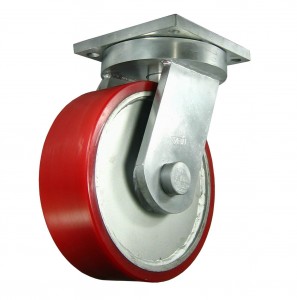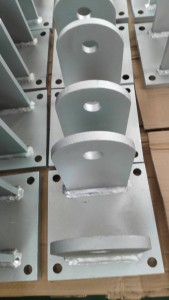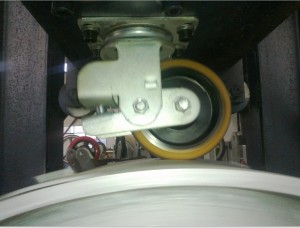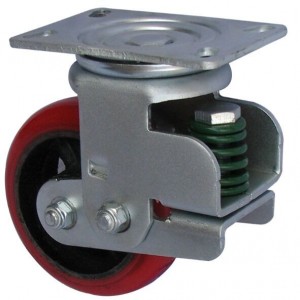
Heavy Duty Castors are manufactured for the most demanding and heavy weight applications, ensuring high performance and longevity are achieved under the most harshest of conditions. Applications using Heavy Duty Castors typically weigh between 5 Tonne to 30 Tonne.
One of the primary differences between Standard Industrial Castors and Heavy Duty Castors & Fabricated Castors is the manufacturing method used to
produce the Castor fork. Standard Industrial Castors are assembled with a pressed steel fork, where the primary part of the bracket is one metal piece manufactured from a “metal pressing” process. Metal pressing is a low cost manufacturing process that is used widely by Castor
Wheel manufacturers, and is suitable for all but the most demanding applications. On the other hand, a Fabricated Castor bracket is built (fabricated) using flat steel plate with a much increased steel gauge thickness. The thick steel plate is cut into sections which are welded together to produce an extremely robust castor fork suitable both high loads and accommodating shock forces.
It goes without saying that Heavy Duty Castors require Heavy Duty Wheels in addition to the Fabricated Fork.
One of the most common Extra Heavy Duty Castor Wheels is a cast aluminium wheel hub, with a thin layer of polyurethane tread. The aluminium provides extremely good loading capacity, whilst the complimentary polyurethane tread provides compliance on hard flooring surfaces, shocks and bumps, in addition to reducing the noise of the wheel during manoeuvring.
Other common Extra Heavy Duty Castor Wheels include Nylon Castor Wheels, Solid Polyurethane Caster Wheels and Cast Iron Wheels.
It is common practice that the Extra Heavy Duty Wheels are manufactured with an increased wheel width, as this increases the size of the wheel, hence its strength but also increases the contact area with the floor, allowing for higher load.
Due to the heavy weight that Extra Heavy Duty Castors can carry, the inertia forces that are required to move a heavy piece of equipment are normally very high, resulting in a high roll resistance. This difficulty is increased further due to the increase wheel width as discussed above. It is therefore important that wheel bearings are used within the Castors wheel to reduce the roll resistance as much as possible. However due to the heavy weights that castors may need to carry certain bearing types may be less suited. Therefore the Castor Wheel supplier of bearing supplier should be consulted about the best bearing type for the weight and forces. These may include Ball Bearings, Roller Bearings and Tapered Bearings. Bulldog Range of Extra Heavy Duty Castors are manufactured which European specification Bearings to ensure high load and impact resistance of achieved.

Extra Heavy Duty Castors are tested thoroughly to the highest quality standards to ensure the safe and effective operation of the wheel and mechanism. Tests May Include:
Drum Role Endurance Test (IOS22833:2004) – This is where the wheel is connected to a rotating drum which in turn rotates the Castors wheel to simulate normal use of the castor. The castor is then tested for 8 hours (travelling nearly 32 kilometres). More information can be found by clicking here – Castor Wheel Endurance Testing
Static Load Testing – This is a simple test where the castor has a compressive load applied to it by a hydraulic or mechanical press. Typically the Castor will be subjected to a load 2 times its maximum load to check for any signs of weakness.
Shock / Fracture Testing – Similar to the Drum Role Endurance Test, the Castor wheel is connected to a rotating drum, however this time the drum has obstacles in which the wheel will have to travel (bump) over. The obstacles typically have a thickness equivalnet to 2% of the diameter of the Castors Wheel. More information can be found by clicking here – Castor Wheel Obstacle Testing
Low & High Temperature Testing – The Castor wheel is tested in an ageing oven, where the Castor is subjected to temperatures slightly higher than their maximum allowable temperatures. The primary focus is on the wheel material (for example Polyurethane) to ensure no deterioration of the Polyurethane or major change in mechanical properties.
Other Test, dependant upon customers application may include Chemical or Fluid Resistance, Salt Spray Testing, Ozone & UV Testing, Compression Set, Resilience, Temperature (as mentioned above), Tensile Strength of the rubber. These properties are specified by what’s called a Line Call Off, which is an American standard – ASTM D2000:2012 – Specifying Mechanical Properties of Polymer Based Products. This ASTM standard is capable of specifying at all types of mechanical properties of Polymer Based products, including Rubber Castors, Polyurethane Castors and Synthetic Rubber Castors. More information can be read by clicking here (ASTM D2000 – How to Read)

For applications where Castors are subjected to high extreme shock loads (for example where an item is dropped onto a trolley or piece of handling equipment). The Castors can be supplied with Spring Loaded Castors which absorb the impact, reducing the forces transferred to the Castor Wheel and considerably reducing the stress, therefore increasing their fatigue life. Spring Castors are a common product on the Market, however customer should ensure that sufficient testing has been conducted by the Castor Wheel supplier or manufacturer to ensure the Springs are manufactured from the correct grades of Spring Steel. Bulldog is currently in the process of releasing a revolutionary new Spring Loads Castor, with many benefits and additional features. At this moment in time we cannot release details as the Patent process is still underway – but watch this space!
Fork Lift Wheels
Heavy Duty Machine Skates (for example Generator Castors)
Material Handling Equipment Castors (for example automotive engine trolleys)
Transportation Containers / Shipping Container Castors & Wheels
Towing Applications – Including Airport Service Equipment Castors (NB: only certain Casters are suitable for Towing
Cargo Handling Equipment Castors
Scrap Metal Carrier Wheels
Any equipment requiring extreme high load capacity
Bulldog Castors Ltd provide expert advice & support to manufacturers and designers of engineering equipment and can be contacted on +44 (0)116 2970521 or sales@bulldogcastors.co.uk